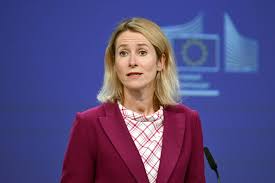Kaja Kallas: A Leader Shaping Estonia’s Future

Introduction
Kaja Kallas has emerged as a significant figure in European politics, serving as the Prime Minister of Estonia since January 2021. As the first female prime minister in the country’s history, her leadership is relevant not only for Estonians but also for the broader European Union. Kallas represents a new generation of political leaders who face complex challenges such as security, climate change, and economic stability.
Political Background
Kaja Kallas, born on June 18, 1977, comes from a politically engaged family; her father, Siim Kallas, served as Estonian Prime Minister and European Commissioner. She has a law degree from the University of Tartu and earned her Master’s in European Law from the University of Amsterdam. Kallas began her political career in 2011, becoming a member of the Estonian Reform Party and later serving as a Member of the European Parliament from 2014 to 2019.
Leadership and Policies
Since taking office, Kallas has focused on various priorities, including digital innovation, strengthening security ties with NATO, and promoting a green agenda. Her government has successfully managed the economic fallout from the COVID-19 pandemic through a combination of fiscal stimulus and social programs. Furthermore, Kallas is a strong advocate for Ukraine, having vocally supported its fight against Russian aggression. Estonia has taken steps to provide military aid to Ukraine and has welcomed numerous Ukrainian refugees, showcasing Kallas’s commitment to humanitarian issues.
Challenges Ahead
Despite her achievements, Kaja Kallas has also faced significant obstacles, particularly regarding rising inflation and energy prices exacerbated by the war in Ukraine. Public dissatisfaction has prompted protests and criticism of her government’s handling of economic issues. Moreover, the looming shadow of Russian influence in the region remains a persistent challenge, requiring a careful balancing act in her foreign policy decisions.
Conclusion
Kaja Kallas represents a pivotal figure not just for Estonia, but also for the future of European leadership as a whole. As she navigates her administration through both domestic and international challenges, her approach to governance may inspire other leaders in similar situations. Observers predict that her tenure will continue to be marked by the struggle for security and economic stability, underscoring her significant role in shaping Estonia’s path in an increasingly complex world.
